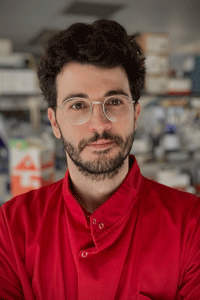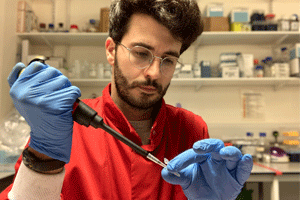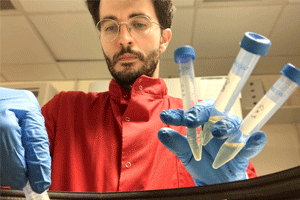LGBTQ+ STEM Day 2023: Daniel Gonçalves-Carneiro
Could you tell us a bit about yourself?
My name is Daniel Gonçalves-Carneiro and I am research

fellow at Imperial College London, UK. I’m a virologist by training, mostly focusing on the biology of HIV-1 infection, which is the virus that causes AIDS. My research is focused on understanding how virus RNA is detected by our immune system and how we can learn from viruses to design better vaccines. I have been a member of the Microbiology Society for a decade and I have been a Champion of the Society for a few years now. I identify as a gay man and whilst working with a few other Champions, I have been actively promoting better professional environments for members of the LGBTQ+ community who are working in microbiology. Outside the lab, I enjoy printmaking, going to gigs and hiking with my dog.
It’s LGBTQ+ STEM Day on 18 November; are you doing anything this year to raise awareness?
This year I’m participating in the LGBTQ+ STEM Day Community & Careers Conference, organised by Pride in STEM. This is a career event dedicated to queer people in STEM. I’m excited to discuss new ways to improve work environments and hear about other people’s experiences in science.
How did you feel about going into academia as someone who is openly part of the LGBTQ+ community?
When I started working in academia, I didn’t come out to my colleagues for a long time. Looking back now, I think I was afraid I was going to be judged, not by my work or my work ethics, but for how I identify. It didn’t help that in the department I worked in initially, I would occasionally hear some homophobic comments. When I swapped fields to HIV research, it made me realise that a substantial part of the research community in that area is openly queer. Meeting other LGBTQ+ scientists gave me the confidence to be who I am in the workplace.
Do you think the STEM community is becoming more open to talking about issues affecting people identifying as LGBTQ+?
Definitely, at least in the countries I’ve worked in as a researcher. I think institutions and societies in general, are more attuned to the role that minorities play in driving research and innovation. Over the past few years, I have noticed a growing interest from departments in developing research culture and creating more accommodating environments for the LGBTQ+ community; ranging from gender- neutral bathrooms to LGBTQ+ book clubs. This is all great news, but let’s not forget that there are many LGBTQ+ scientists working elsewhere that still don’t have a voice, so we need to think of ways of supporting the people who are more isolated.
Could you tell us about what you’re currently working on?
My lab is attempting to find out how the nucleotide sequence of virus genomes impacts virus infection. The nucleotide sequence of RNA or DNA contains much more information than just a ‘recipe’ to make a particular protein. Instead, the way that information is written can determine the severity of virus infections. You can think about it as an ‘accent’, where we may all speak English, but the accents we adopt may give away where we are from. Similarly, our immune system can identify nucleotide sequences that look foreign by detecting motifs that are more commonly found in virus RNA than in our own RNA. This is a relatively new area that I find very exciting! We’re discovering that some viruses can use these patterns to bypass our immune defences, and in turn, we can use this information to make better vaccines.

If you hadn’t gone into science, what career path would you have chosen?
I’ve played musical instruments all my life, so I would probably have tried to pursue a music career. Music is still a very big part of my everyday routine and despite the growing time commitments of a career in science, I still find time to practise somewhat regularly. I used to write about music when I was younger, so maybe something in music journalism may also have been a fulfilling career.
Have you experienced any bias or prejudice in academia as a result of your LGBTQ+ identity?
Thankfully, as far as I’m aware, no. I think that I have mostly been judged by my research and my interpersonal skills, but it’s hard to know for sure. However, I did work in environments that were not necessarily welcoming to LGBTQ+ scientists, which is something that I’m trying to change.
What advice would you give to someone considering coming out while in STEM / considering going into STEM?
I want to say that, for many of us, being open about your

identity at work can be a liberating and affirming experience. However, you must think about your safety first. In many countries, LGBTQ+ people are still prosecuted, so considering coming out in STEM might put yourself in danger. Things are changing and it may take a little longer for that change to happen in certain parts of the globe. For people in these circumstances, I would advise them to connect with other LGBTQ+ scientists through networks such as Pride in STEM, oSTEM and Pride in Microbiology Network. Talk to as many people as you can and find ‘remote’ support in these communities. For others of us living in societies in which being LGBTQ+ is more widely accepted, I would say that coming out in the workplace might be easier than what you think. Find allies that will support you through the process and be confident about who you are. Science and STEM in general, can be an extraordinarily fulfilling career choice and you shouldn’t deprive yourself of that opportunity.
Do you have any role models, if so, who?
I have many role models and I’ve been learning so much from them over the course of my career. One scientist that I admire is Dr Jason Mellad, who is the co-founder of Start Codon, UK. Jason is such a wave of positivity and confidence! Another brilliant scientist that has influenced my career is Professor Sun Hur at the Harvard Medical School. She has always given me very good career advice and she is a reference of scientific rigour and creativity to me.
What has been the highlight of your career so far?
The teams I have worked with are the best aspect of my career. I continually meet such amazingly generous and creative people, who keep me afloat when research itself isn’t being very kind. I am constantly in awe of what humans can do in the right environment and with the right support. I’m at my best when working in a very dynamic team and the reward you get from solving tough problems together will always be the most gratifying thing about my research.
What do you hope to achieve in your career in the future?
Now that I’m building my own group, my greatest ambition is to develop an energetic and highly skilled research team. I want to create a research environment in which people aren’t afraid of asking questions or speaking their minds. There are very difficult problems to be addressed in virology and I believe that the only way we can solve them is by producing good ‘team science’. If one day the research culture in my lab gets more citations than my publications, I would consider myself successful.
Could you tell us why you have decided to join the Society and become a Champion?
I have watched the Society evolve over many years, so I became a Champion because I wanted to contribute to that change. In particular, I wanted to add things that I thought were missing from the Society. Along the way, I met incredible individuals that shared a vision of what science and the Society could be. I highly recommend for anyone interested in microbiology to join!
To find out more about our EDI initiatives and take part in an upcoming Awareness Day, view our equality, diversity and inclusion webpages.
